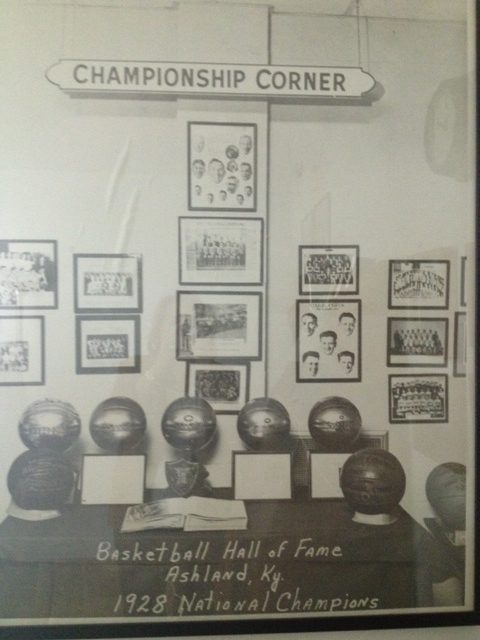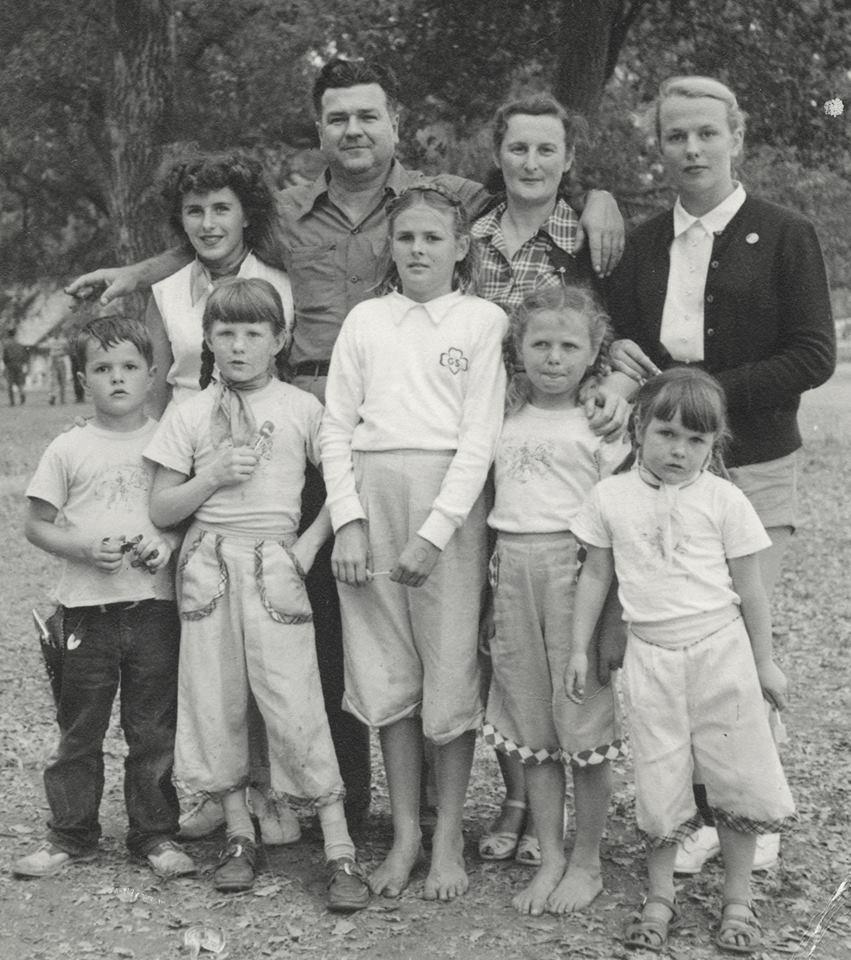This is my family, the Strothers, at my father’s company picnic at Irvine Park in Southern California. The year was 1952, and my sisters, Cynthia and Kay (The Bell Sisters), had just won a TV talent show, and they were headed off to Hollywood.
We were a scruffy bunch and quite the competitors. It was a day-long contest, family against family in sports from three-legged races to baseball. We should have won…but Dad forgot a small prize he had tucked away into his shirt pocket.
Since publishing my book several years ago, I have presented at dozens of book signings from California to Canada. I have met so many extraordinary individuals. From these contacts, one thing has become crystal clear to me…EVERYONE has a story to tell.
At the end of my presentations, I ask for questions. Without a doubt, the most common inquiry I receive (after “Are all those crazy stories really true?”) is “How do you go about writing a memoir?”
I love that question. Because, like I said, everybody has a story to tell. Like, the World War ll veteran who told me he met his wife on a small farm in France during the liberation of Europe.
“We fell in love almost instantly, and it took months of hard work to bring her home to the States.”
Still married decades later, the herculean task and the fear of being separated from the woman he loved was still fresh in his mind.
Or, the lady whose parents lived through the Dust Bowl in the drought-stricken Southern Plains region of the United States.
My father said, “Nothing would grow, so we boarded up the family farmhouse and headed west with the tired old pickup stacked high with all of our belongings hefted up on top.”
Still seared into his memory was the sad looks on the faces of town folks they passed by.
“Loaded down with dirty kids and crying babies, we must have been a pitiful sight to see,” he told me with a hint of sadness in his watery grey eyes.
Then there was the elegantly attired lady who shared the plight her family faced when her father died of typhoid fever, and her mother had to work outside of the home, leaving her to become the mother to her younger siblings.
“In those days, women didn’t work in town. I was barely eleven and had to cook, clean, and care for my three little sisters.”
Or, the immigrant from Poland who landed in New York City with only a scrap of paper with a name on it.
“I only had an address and a name of a distant cousin. I was excited to be in the USA and terrified at the same time. This person I barely knew let me sleep on his couch until I got on my feet.”
I heard one story after another, each unique and special in its own way. Some were very dramatic, and others were just the musings of a life well-lived. There were funny and weird stories as well – like paying neighbors in beer to push a piano around the block for your songwriting daughter. Or how you meet a rich man on the bus, and he pays for your college career … and then your sister’s college career when you dropout.
Of course, no one’s life is pain-free. All the folks I spoke with had trials and tribulations to overcome, some more serious than others. But, upon hearing their stories, I felt each needed to be remembered and passed along to family members so they might know more of their history.
I’m not suggesting that everybody needs to or wants to go to all the work and energy it takes to write and have a memoir published. (Maybe “memoir” sounds too overwhelming. Perhaps your “life story” might be a better description of the project.) I feel confident you won’t regret the decision. When I finished my memoir, numerous family members thanked me for doing it.
My grandson said, “I had no idea all those things happened. Thank you for preserving our family history for future generations”.
“I wish I had realized that family history is a perishable commodity. It disappears with time, as memories fade, and as loved ones pass on. I wish I had known that the most important aspect of family history is preserving a record of the present for the future.”
Guy Black
So, where do you begin and what do you do if your computer skills are non-existent?
I was lucky when I began the task. In my freshman year of high school, my mother insisted I learn to type. (When I was a kid, most girls were directed into secretarial work or teaching.) With typing mastered, sort of, I began to put my stories down on paper. I wrote about poignant episodes I witnessed, scary events I observed, or embarrassing predicaments I got myself into. Most of my stories were self-deprecating and tilted toward humor. I tended to laugh things off, which was my way of dealing with the chaos in my life.
If you don’t have any stories written down and you are not computer savvy, I suggest you get a voice recorder of some kind and start talking. Start at the beginning. Who were your parents, and how did they meet? What about your grandparents, were they an essential part of your life? How many siblings did you have?
Describe the disasters, divorces, and triumphs over adversity. What made you, you? Keep the focus on striking or life-changing events. What comes up in your mind may be salient for the mere fact it popped into your head. The story doesn’t have to be perfect or exactly chronological. Record or write down events that impacted your life.
If you are stumped, make a list of any happenings you have questions or concerns about. Why did your sister go with your mother when your parents divorced while you felt pressured to stay with dad? Why did your father insist you play football when you obviously hated it? Why did your mother spend so much time in bed?
You get the idea. All of us have unfinished business in our lives. These are questions you may want to explore or explain out loud or on paper. (Personally, I contacted my siblings for clarification and input of details I felt doubt about.) Perhaps the answers to these questions will help explain your behaviors or decisions in the past.
Don’t be afraid to write down the truth as you see it. If other members of the family saw it differently, that’s okay. We all look at life through a different lens and from a different perspective. Even siblings, close to the same age, will disagree on how or why an incident occurred. This is your story, as you saw it and as you believe it happened. They can write their own memoir.
Every time I see an ad for “Ancestry.com” or some other company touting the joy of discovering your family history, I think about how challenging family research can be. Each of us holds in our minds unique clues that need to be chronicled before they are lost to time. The family tree needs to be nourished and fed. I hope you will give this idea consideration. Like I said. We each have a story to tell. I hope you’ll do it.

My dad, Eugene Rex Strother, is in the Basket Ball Hall of Fame. Dad took this picture on a trip to Kentucky he shared with his biggest fan, my mother and his wife of 55-plus years, Edith Strother. If I remember correctly, his team, the Ashland Tomcats, is the only high-school team in the Basket Ball Hall of Fame.
When I read a recap of the final minutes of the game, I realized why this event was one of the most important events in my father’s life.
The information below was taken from the following internet articles: The Year Of The Ashland Tomcats; Kentucky Living, January 1, 2002 Reliving Mountain Basketball Tradition: 1928 Excellence, By Nick Roush
“Neither team scored in the first three-minute overtime period.
Nor the second.
Nor the third.
Ashland’s Gene Strother broke the ice at the tip-off of the final overtime with a long shot from the corner. Seconds later, future UK All-American Elis Johnson broke loose for a layup to put the Tomcats up 13-9, but Zelda Hale countered with a short shot to bring it back to 13-11.
Then the stall began.
In 1928, a jump ball was held after every score, and teams did not have to bring the ball across the center line of the floor in 10 seconds as they do today.
Ashland got possession on the subsequent jump ball and used the
entire floor to protect its lead for nearly two minutes, the crowd
delirious as the clock ticked away. Ellis Johnson’s dribbling stalled the game to give Ashland an undefeated State Championship.”

